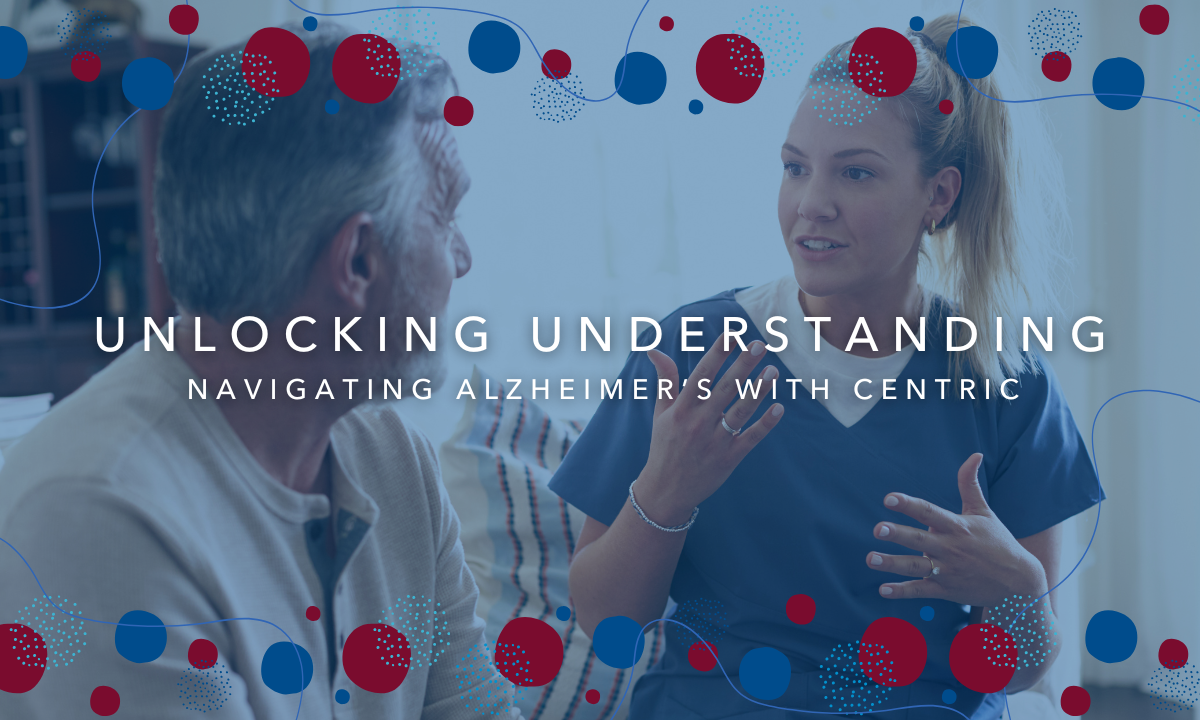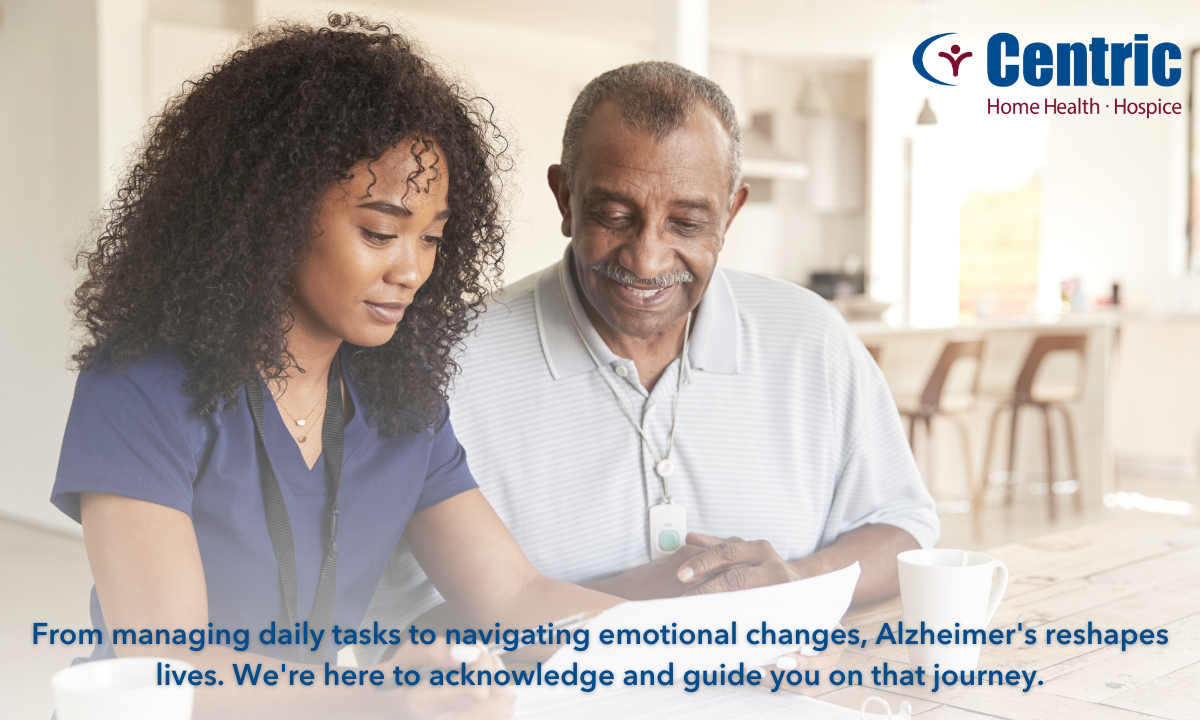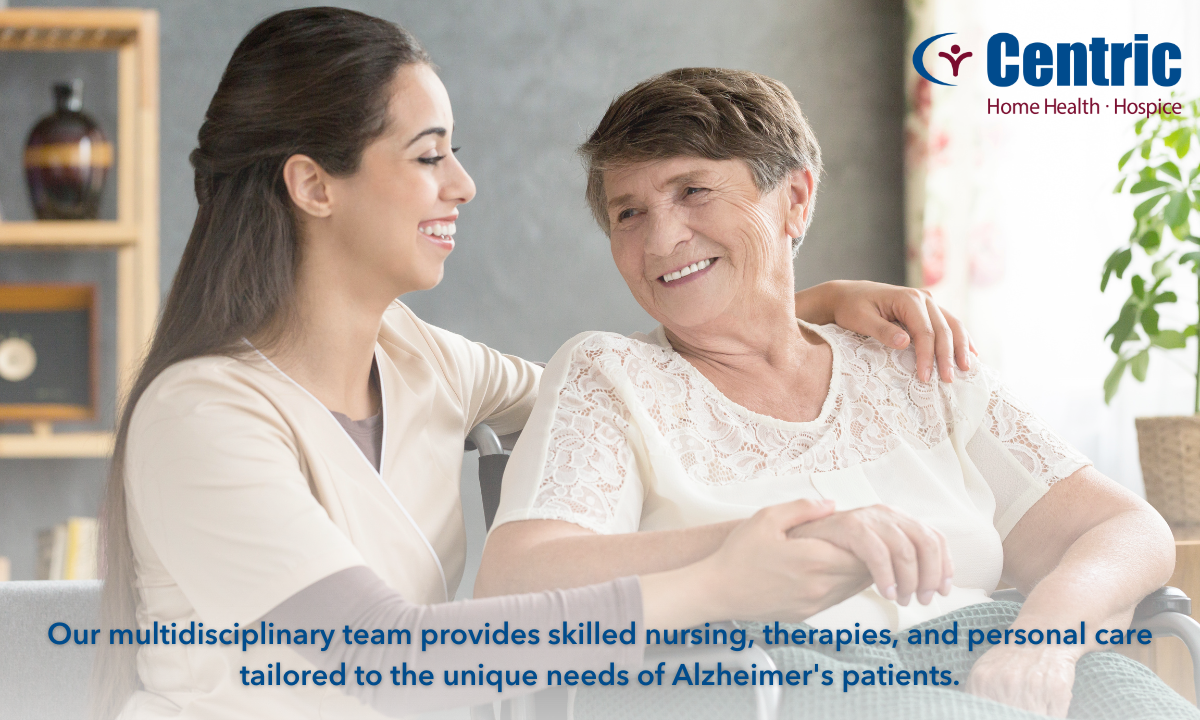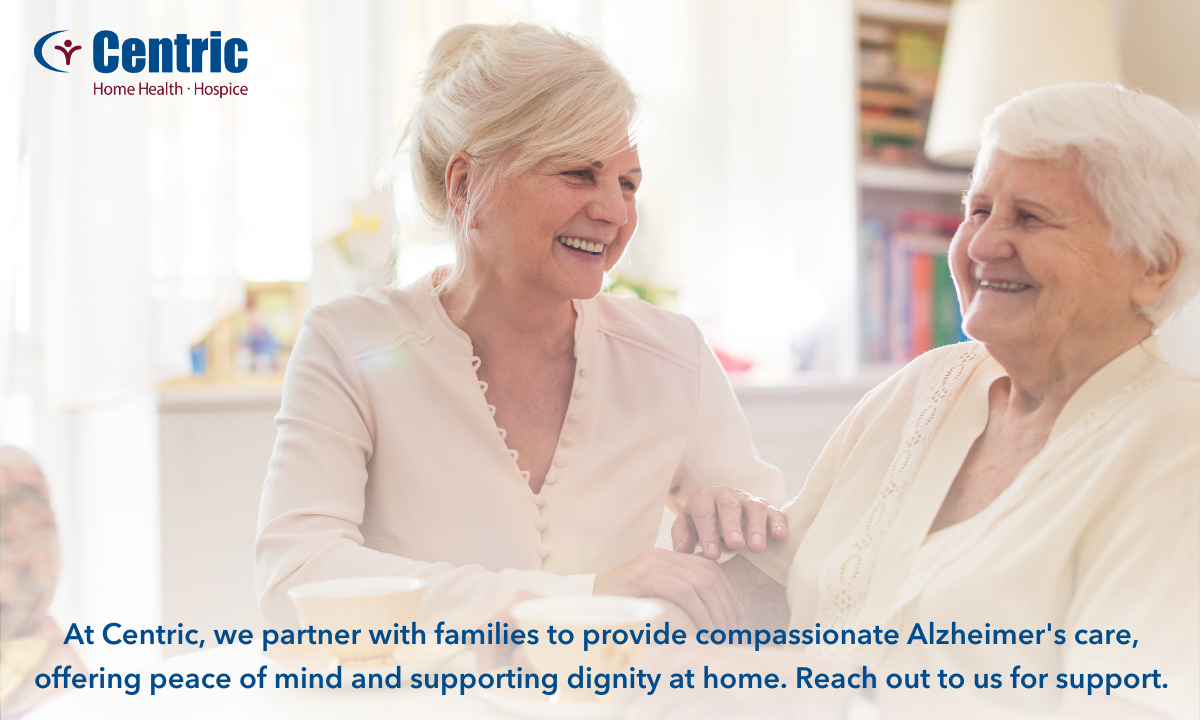Unlocking Understanding
Alzheimer's Disease: Understanding and Support from Centric During Brain Awareness Month
June marks Brain Awareness Month, a time dedicated to illuminating the incredible complexities of the human brain and fostering deeper understanding of neurological conditions. For adult children, the prospect of a parent facing cognitive decline, particularly Alzheimer's disease, can be incredibly challenging and emotionally overwhelming.
At Centric Home Health & Hospice, we understand the profound impact Alzheimer's has on individuals and their families. This month, we aim to provide clarity on this prevalent disease and, more importantly, illustrate how our compassionate, specialized home health services can be an indispensable partner in supporting your loved ones and providing peace of mind right in the familiar comfort of their own homes.

Understanding Alzheimer's is a Journey of Cognitive Change
Alzheimer's disease is the most common cause of dementia, a general term for memory loss and other cognitive abilities serious enough to interfere with daily life. It is a progressive neurodegenerative disease, meaning it gradually destroys brain cells, leading to a continuous decline in thinking, behavioral, and social skills that affects a person's ability to function independently.
Unlike normal age-related memory changes, Alzheimer's involves more significant memory loss that disrupts daily life, challenges in planning or solving problems, difficulty completing familiar tasks, confusion with time or place, and new problems with words in speaking or writing. The disease typically progresses through
several stages, each bringing increasing challenges.
Early-Stage (Mild Alzheimer's): In this stage, individuals may still function independently but experience occasional memory lapses, such as forgetting familiar words or the location of everyday objects. Friends and family may begin to notice difficulties.
Middle-Stage (Moderate Alzheimer's): This is typically the longest stage, where brain damage becomes more widespread. Memory loss and confusion worsen, and individuals may have difficulty recognizing loved ones, managing personal care, or controlling behavior. Wandering and personality changes are common.
Late-Stage (Severe Alzheimer's): In the final stage, individuals lose the ability to respond to their environment, carry on a conversation, and eventually control movement. They require extensive care around the clock and may become vulnerable to infections.
Early diagnosis is crucial, not only for potential treatment options that can temporarily slow symptom progression but also for allowing patients and families to plan for the future, understand the disease, and access support services.

The Profound Impact on Daily Life – And on Devoted Families
Living with Alzheimer's disease profoundly alters an individual's daily life. Tasks that were once automatic – preparing meals, managing finances, remembering appointments, or even personal hygiene – become increasingly difficult, leading to a significant loss of independence. As the disease progresses, individuals may experience disorientation, personality changes, communication difficulties, and behavioral challenges like agitation or wandering. This gradual decline in autonomy can be deeply distressing for the individual, often leading to feelings of frustration, fear, or sadness.
The impact on adult children and other family caregivers is equally profound. Witnessing a parent's memory fade or their personality change can be emotionally agonizing. The demands of caregiving often escalate, requiring more time, energy, and resources. Adult children frequently find themselves juggling their own careers, families, and personal lives with the increasing responsibilities of managing a parent's complex care needs. This can lead to caregiver burnout, stress, financial strain, and feelings of isolation. Providing continuous, specialized care while preserving a parent's dignity and ensuring their safety can become an overwhelming challenge. This is precisely where professional, compassionate home health services become an invaluable resource, offering a vital lifeline to both the patient and their devoted family.
How Centric Home Health & Hospice Provides Specialized Alzheimer's Support
At Centric Home Health & Hospice, we understand that caring for someone with Alzheimer's disease requires a highly specialized, compassionate, and truly holistic approach that extends beyond just medical needs. Our mission is to care for the whole person, encompassing their physical, emotional, mental, and spiritual well-being. We partner closely with adult children, providing expert, empathetic care that enables their loved ones to maintain dignity, familiarity, and the highest possible quality of life in the comfort and security of their own home.
Our comprehensive, multidisciplinary services are meticulously tailored to address the unique and evolving challenges presented by Alzheimer's disease at every stage.

Skilled Nursing Care: Our registered nurses (RNs) and licensed practical nurses (LPNs) are expertly trained in geriatric care and neurological conditions. They provide crucial medication management, ensuring medications are taken correctly and on schedule—a common challenge for those with Alzheimer's. They monitor for changes in cognitive function, manage co-existing medical conditions, provide wound care if needed, and vigilantly watch for signs of infection or other complications. Our nurses also serve as vital educators, teaching families effective communication techniques and strategies for managing behavioral symptoms.
Physical Therapy: As Alzheimer's progresses, balance, coordination, and mobility can decline, increasing the risk of falls. Our physical therapists develop individualized exercise programs designed to maintain or improve strength, balance, and gait. They implement fall prevention strategies and help patients retain functional mobility as long as possible, adapting exercises to cognitive abilities.
Occupational Therapy: Maintaining independence in daily activities is paramount for dignity and quality of life. Our occupational therapists specialize in adapting daily tasks and environments for individuals with cognitive decline. They assess challenges with dressing, bathing, grooming, feeding, and other self-care activities. They then teach adaptive techniques, recommend specialized equipment (e.g., adaptive utensils, grab bars), and modify the home environment to enhance safety, reduce frustration, and promote greater independence for as long as possible.
Speech-Language Pathology: Alzheimer's can significantly affect communication abilities, both in understanding and expressing thoughts, and also swallowing safety. Our speech-language pathologists provide therapy focused on improving communication clarity, language comprehension, and cognitive functions like memory, attention, and problem-solving through tailored exercises. They also conduct swallowing assessments and provide strategies to ensure safe eating and prevent aspiration, which is critical for maintaining nutrition and preventing complications.
Medical Social Services: Navigating the complexities of Alzheimer's care can be overwhelming. Our medical social workers offer invaluable emotional support and guidance to both patients and their families. They assist with long-term care planning, help connect families with vital community resources (e.g., support groups, adult day care), provide counseling, and act as a crucial liaison, helping families cope with the emotional toll and practical challenges of the disease.
Certified Home Health Aides: These compassionate caregivers are the bedrock of daily support. They provide essential assistance with activities of daily living (ADLs) such as bathing, dressing, personal hygiene, and meal preparation. Beyond physical assistance, they offer companionship, engage patients in familiar activities, and provide a comforting, consistent presence. They also serve as an extra set of observant eyes and ears, reporting any changes in the patient's condition to the Centric care team.

The Centric Difference: A Holistic, Patient-Centered Approach to Alzheimer's Care
At Centric, we firmly believe that comprehensive care means treating the person living with Alzheimer's, not just the disease. Our dedicated multidisciplinary team collaborates seamlessly with physicians and families to develop a truly individualized care plan that evolves with the patient's needs. We focus on enhancing their strengths, preserving their dignity, and fostering engagement in meaningful ways. For adult children, this means not just receiving expert medical care for their parent, but also experiencing profound peace of mind. Knowing your loved one is receiving professional, empathetic, and continuous support in their cherished home environment can significantly ease the immense burden of caregiving. We aim to free families to focus on quality time, emotional connection, and cherished moments, rather than solely on the tasks of care.
This Brain Awareness Month, we encourage you to learn more about Alzheimer's disease and consider how Centric Home Health & Hospice can be a vital resource for your family. If your parent or loved one is living with Alzheimer's or another neurological disorder, please do not hesitate to
reach out to us. We are here to partner with you, offering expert care and compassionate support so your loved ones can experience the best possible quality of life in the familiar comfort of their own home.
Disclaimer: This blog post is for informational purposes only and should not be considered professional medical or legal advice.
Share This On Your Favorite App